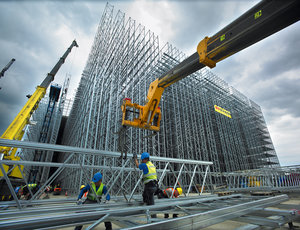Public Private Partnerships in Vietnam – Part 2: The Tendering Process
 By: Dezan Shira & Associates
By: Dezan Shira & Associates
Editor: Ellena Brunetti
Public Private Partnerships (PPP) are a growing and profitable entry point to the Vietnamese market. For firms seeking to tap into these opportunities, several steps must be followed as part of the investment process, including the preparation of a project proposal, its submission, and the tendering process. In part two of Vietnam Briefing’s series on PPPs, we help to shed light on the tendering stage of this process.
In recent years, the procurement law, which was amended in 2014, and its implementing regulations have brought significant changes to existing regulations on the selection of investors for PPPs. While the revision of this legislation has resulted in regulatory uncertainty for current and potential investors, its amendments are largely seen to be in line with international standards regarding public procurement. The adoption of these standards represents great strides for the development of regulatory infrastructure in Vietnam and is set to enhance transparency, efficiency, and competition regarding bidding documents and bidding procedures.
 RELATED: Pre-Investment, Market Entry Strategy Advisory from Dezan Shira & Associates
RELATED: Pre-Investment, Market Entry Strategy Advisory from Dezan Shira & Associates
A more transparent bidding process
First off, the scope of the tendering process has been extended to projects funded by less than 30 percent state capital, a move likely to enhance transparency regarding the bidding process in Vietnam. Under the 2005 Bidding Law, investors were often uncertain about the rules regarding state involvement in the tendering process, as the level of state investment is often not clear at that stage. In the new law on public procurement, it is made clear that rules will apply to all PPPs.
In addition to adjusting the regulation of state sponsored projects, Vietnam plans to develop an efficient network for online bidding, a growing trend throughout the world, whose mains advantages are improving publicity and transparency in bidding events. Pursuant to this objective, the Ministry of Finances and the Ministry of Plans have worked together and adopted Circular No. 07/2015/TTLT-BKHDT-BTC dated September 8, 2015, which replace the previous pilot e-bidding system circular. The introduction of this system should help to protect investors by ensuring fairer competition for all contractors.
Adding to these measures aimed at increasing transparency, the 2013 Bidding Law (the Law) introduces some legal safeguards to fight conflicts of interests of procurement officials that could occur in the bidding process, and therefore, preserve the integrity of the public procurement process in Vietnam. According to Article 89.6, conflicts of interest on the part of the procurement official are considered to be failure to ensure the fairness and transparency of bidding, and will lead to the disqualification of these individuals as per Article 90.1 and 90.2.
Furthermore, a bidding that has been unlawfully won, thanks to corruption or an abuse of position, can now, according to Article 17.4, be cancelled.
 RELATED: Public Private Partnerships in Vietnam – Part 1: Industry and Contract Structures
RELATED: Public Private Partnerships in Vietnam – Part 1: Industry and Contract Structures
Improving competitive bidding
Article 15.2 of the Law stipulates that international tendering become the main method of selection for PPP projects. Also, according to Article 20.2 of the Law, selection of investors must result from an open tender process, while limited tenders are restricted to projects that are “highly technical”. However, while the Law has created improvements, it is not precise enough, as it neither properly defines what criteria should be applied to qualify a project as “highly technical”, nor does it indicate who decides whether or not a project is “highly technical”.
It should be noted that bid dossiers that promote employment of Vietnamese workers and consumption of Vietnamese goods and raw materials will be preferred to others. Therefore, if bid dossiers are ranked equally, priority will be given to the contractor who proposes higher domestic expenses or higher domestic employment.
These changes must be seen as a reaction to the rise of Chinese contractors under the former Bidding Law. In addition, the revised Law also restricts winning contractors from using foreign workers for jobs that can be done by Vietnamese. The revised Law also puts restrictions on imports of goods and equipment that are locally available.
However, according to Article 39 (1) of the Law, the lowest cost method is still the method of choice when choosing a contractor, meaning that it is the contractor offering the lowest price that will win the bid. This method is commonly used in a number of developing countries. However, as the new Law forbids contractors from bringing in their own workers and raw materials, the effects of this rule decreases the chances that European companies will win bids, as the cheap prices offered mostly by Chinese companies results from limited building costs.
|
Asia Briefing Ltd. is a subsidiary of Dezan Shira & Associates. Dezan Shira is a specialist foreign direct investment practice, providing corporate establishment, business advisory, tax advisory and compliance, accounting, payroll, due diligence and financial review services to multinationals investing in China, Hong Kong, India, Vietnam, Singapore and the rest of ASEAN. For further information, please email vietnam@dezshira.com or visit www.dezshira.com. Stay up to date with the latest business and investment trends in Asia by subscribing to our complimentary update service featuring news, commentary and regulatory insight. |

Annual Audit and Compliance in Vietnam 2016
In this issue of Vietnam Briefing, we address pressing changes to audit procedures in 2016, and provide guidance on how to ensure that compliance tasks are completed in an efficient and effective manner. We highlight the continued convergence of VAS with IFRS, discuss the emergence of e-filing, and provide step-by-step instructions on audit and compliance procedures for Foreign Owned Enterprises (FOEs) as well as Representative Offices (ROs).
 Navigating the Vietnam Supply Chain
Navigating the Vietnam Supply Chain
In this edition of Vietnam Briefing, we discuss the advantages of the Vietnamese market over its regional competition and highlight where and how to implement successful investment projects. We examine tariff reduction schedules within the ACFTA and TPP, highlight considerations with regard to rules of origin, and outline the benefits of investing in Vietnam’s growing economic zones. Finally, we provide expert insight into the issues surrounding the creation of 100 percent Foreign Owned Enterprise in Vietnam.
 Tax, Accounting and Audit in Vietnam 2016 (2nd Edition)
Tax, Accounting and Audit in Vietnam 2016 (2nd Edition)
This edition of Tax, Accounting, and Audit in Vietnam, updated for 2016, offers a comprehensive overview of the major taxes foreign investors are likely to encounter when establishing or operating a business in Vietnam, as well as other tax-relevant obligations. This concise, detailed, yet pragmatic guide is ideal for CFOs, compliance officers and heads of accounting who must navigate Vietnam’s complex tax and accounting landscape in order to effectively manage and strategically plan their Vietnam operations.
- Previous Article Vietnam News Brief: Information Security, Venture Capital Regulations, and New Tariff on Steel Imports
- Next Article Mutterschaftsurlaub in Vietnam
































